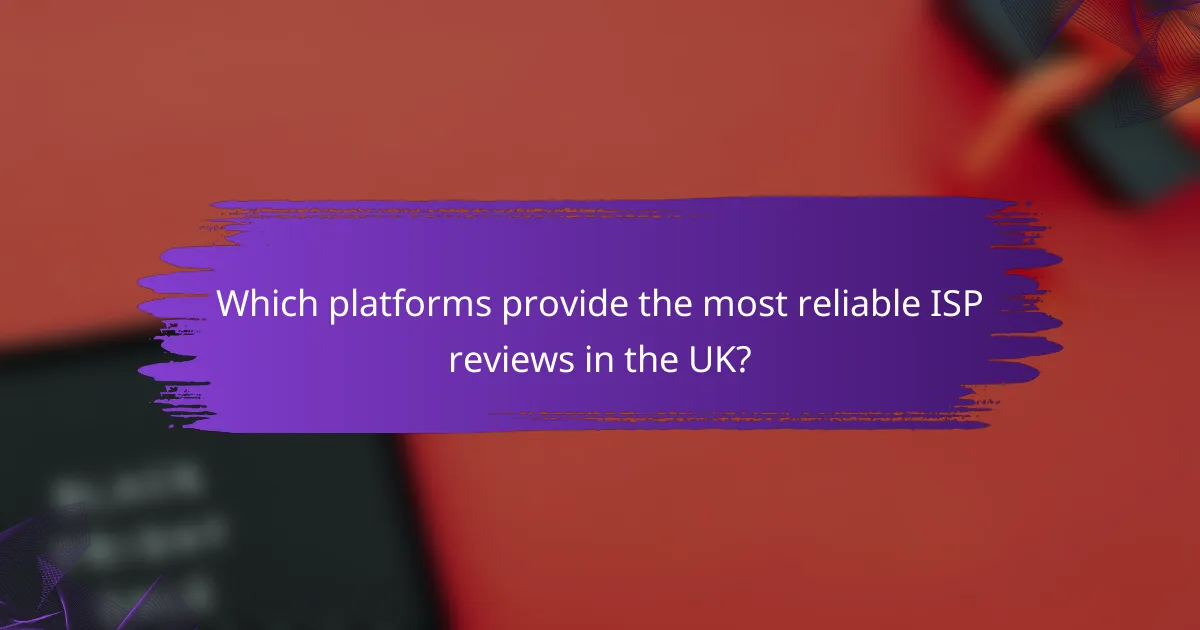Online reviews play a crucial role in influencing ISP selection in the UK, as they shape consumer perceptions and guide decision-making. Potential customers often turn to the experiences of others to evaluate the reliability and quality of internet service providers. The trustworthiness of these reviews is determined by factors such as the credibility of the reviewer and the volume of feedback, making it essential for consumers to understand these elements for informed choices.

How do online reviews influence ISP selection in the UK?
Online reviews significantly impact ISP selection in the UK by shaping consumer perceptions and guiding their choices. Potential customers often rely on the experiences of others to assess the reliability and quality of internet service providers.
Impact on consumer decision-making
Online reviews play a crucial role in consumer decision-making by providing insights into the experiences of existing customers. Many users consult review platforms before committing to an ISP, often prioritizing services with higher ratings and positive feedback.
When faced with multiple options, consumers may choose an ISP based on the volume and positivity of reviews. A strong presence of favorable reviews can sway potential customers towards a particular provider, while negative feedback can deter them.
Correlation with service quality
There is often a direct correlation between online reviews and the perceived quality of service provided by ISPs. Customers frequently mention specific aspects such as speed, reliability, and customer support in their reviews, which can influence the overall reputation of an ISP.
For instance, an ISP consistently receiving high ratings for speed and minimal downtime is likely to attract more customers. Conversely, frequent complaints about slow speeds or poor customer service can lead to a decline in new subscriptions.
Effect on brand reputation
Online reviews significantly affect the brand reputation of ISPs in the UK. A strong collection of positive reviews can enhance an ISP’s credibility, making it more appealing to potential customers. This can lead to increased market share and customer loyalty.
On the other hand, a few negative reviews can tarnish an ISP’s reputation, especially if they are not addressed promptly. ISPs that actively engage with customers and respond to feedback tend to maintain a better public image and can mitigate the impact of negative reviews.

What factors determine the trustworthiness of online reviews?
The trustworthiness of online reviews is influenced by several key factors, including the credibility of the reviewer, the volume and recency of reviews, and the reliability of the platform hosting them. Understanding these elements can help consumers make informed decisions when selecting products or services.
Reviewer credibility
Reviewer credibility refers to the perceived expertise and reliability of the individual providing the review. Factors such as the reviewer’s profile, history of contributions, and any verification badges can enhance their credibility. For example, a reviewer with a long history of detailed and helpful reviews on a specific product category is generally seen as more trustworthy.
Additionally, look for reviews that provide specific details about the product or service, as these often indicate a genuine experience rather than a generic opinion. Reviews from verified purchasers can also add to the trustworthiness of the feedback.
Review volume and recency
The volume of reviews can significantly impact their trustworthiness. A high number of reviews, especially if they are recent, suggests a consistent level of customer satisfaction or dissatisfaction. For instance, a product with hundreds of reviews over the past few months is likely to provide a more accurate picture than one with only a few dated reviews.
Recency is equally important; reviews that are several years old may not reflect current product quality or service standards. Aim to prioritize reviews from the last six months to a year for the most relevant insights.
Platform reliability
The reliability of the platform where reviews are posted plays a crucial role in determining trustworthiness. Established platforms with strict moderation policies tend to have more authentic reviews. For example, sites like Trustpilot or Google Reviews often implement measures to verify user identities and filter out fake feedback.
When assessing a platform, consider its reputation for handling fraudulent reviews and whether it provides clear guidelines for posting. A trustworthy platform will typically have a transparent process for reporting and addressing suspicious reviews.

Which platforms provide the most reliable ISP reviews in the UK?
In the UK, platforms like Trustpilot, Google Reviews, and Which? Trusted Traders are known for offering reliable ISP reviews. These platforms aggregate user feedback, helping potential customers make informed decisions based on real experiences.
Trustpilot
Trustpilot is a widely recognized review platform that allows users to rate and review ISPs based on their experiences. It features a star rating system and detailed written reviews, which can provide insights into customer service, reliability, and overall satisfaction.
When using Trustpilot, look for ISPs with a high number of reviews and an overall positive rating. Be cautious of companies with few reviews or a significant number of negative comments, as these may indicate potential issues.
Google Reviews
Google Reviews is integrated with Google Maps and search results, making it easy to find ISP ratings while searching online. Users can leave star ratings and comments, which are visible to anyone searching for that ISP.
To evaluate an ISP on Google Reviews, consider both the average star rating and the recency of the reviews. Recent feedback can provide a clearer picture of the current service quality, while a higher volume of reviews can enhance reliability.
Which? Trusted Traders
Which? Trusted Traders is a platform that verifies businesses, including ISPs, to ensure they meet certain standards of service. Reviews on this site are often more rigorous, as they come from customers who have used the service and are verified by the platform.
When assessing ISPs on Which? Trusted Traders, pay attention to the verification badge, as it indicates that the ISP has passed specific checks. This can provide an additional layer of trustworthiness compared to unverified reviews on other platforms.

How can consumers assess the authenticity of online reviews?
Consumers can assess the authenticity of online reviews by examining various indicators that suggest whether a review is genuine or fabricated. Key factors include the reviewer’s history, the language used, and patterns in the reviews themselves.
Identifying fake reviews
Fake reviews often exhibit certain characteristics that can help consumers identify them. Look for overly positive language that seems exaggerated or generic, as well as reviews that lack specific details about the product or service. Additionally, a sudden influx of reviews within a short time frame can indicate manipulation.
Another red flag is the presence of multiple reviews from the same IP address or user profile, which may suggest coordinated efforts to boost ratings. Consumers should be cautious of reviews that seem too good to be true, as they often are.
Analyzing reviewer patterns
Examining reviewer patterns can provide insights into the authenticity of reviews. Check if the reviewer has a history of posting reviews across various platforms or if they focus solely on one brand or product. Genuine reviewers typically have a diverse review history.
Additionally, consider the balance of positive and negative reviews from the same user. A reviewer who only leaves five-star ratings may be less credible than one who provides a mix of ratings, as this suggests a more realistic perspective.
Using review aggregation tools
Review aggregation tools can help consumers filter and analyze reviews from multiple sources, making it easier to assess authenticity. These tools often provide insights into the overall sentiment of reviews and highlight potential fake ones based on algorithms that detect suspicious patterns.
Popular tools include Trustpilot, Yelp, and Google Reviews, which allow users to see aggregated ratings and read detailed reviews. Using these platforms can save time and enhance the decision-making process when selecting an ISP or any other service.

What criteria should be used for selecting an ISP based on reviews?
When selecting an Internet Service Provider (ISP) based on reviews, focus on service reliability and customer support quality. These criteria significantly impact your overall experience and satisfaction with the service.
Service reliability
Service reliability refers to the consistency and stability of the internet connection provided by the ISP. Look for reviews that mention minimal downtime and fast recovery times when outages occur. A reliable ISP typically maintains a service uptime of over 99%, ensuring that you have access to the internet when you need it.
Check for user feedback on connection speeds and performance during peak usage times. An ISP that can deliver advertised speeds consistently, even during busy hours, is often a better choice. Consider ISPs that offer a money-back guarantee if they fail to meet their service level commitments.
Customer support quality
Customer support quality is crucial for resolving issues quickly and effectively. Look for reviews that highlight the responsiveness and helpfulness of the ISP’s support team. ISPs with 24/7 support and multiple contact methods, such as phone, chat, and email, tend to receive higher satisfaction ratings.
Evaluate the average response times and the effectiveness of the solutions provided. An ISP that resolves most issues on the first contact is preferable. Avoid providers with frequent complaints about long wait times or unhelpful representatives, as these can lead to frustrating experiences when problems arise.
